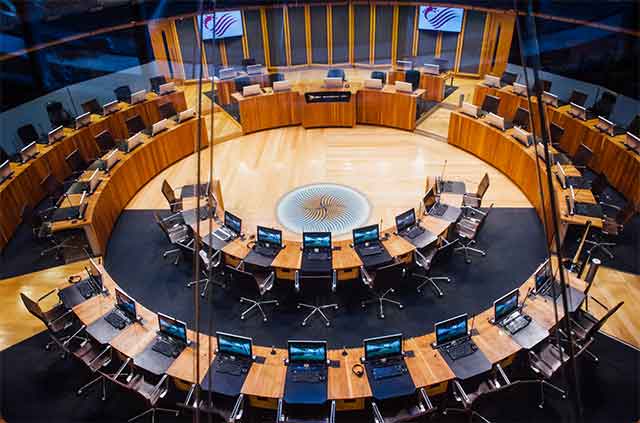Far too many children and young people are unable to access support under Wales’ new additional learning needs system, leaving families at breaking point, the Senedd heard.
Jack Sargeant led a debate on a 15,000-name petition, submitted by Victoria Lightbown, raising concerns about implementation of the additional learning needs (ALN) system.
He said the ALN reforms have triggered more petitions in recent months than any other subject aside from 20mph, with five being considered by the petitions committee.
Mr Sargeant raised Estyn’s concerns about inconsistent application of reforms under the ALN Act, which is replacing the previous special educational needs (SEN) system.
The Labour MS, who chairs the petitions committee, said he has heard harrowing stories of parents having to fight against a system that sometimes feels inflexible and unsympathetic.
‘Inconsistency’
Buffy Williams, the newly elected chair of the Senedd’s education committee, said there is enthusiasm for the reform’s core principles but too much inconsistency on the ground.
She cautioned that a new category of pupils, with lower level additional needs, is emerging.
“They were on schools’ old SEN registers,” said the Labour backbencher.
“But for various reasons – which include funding, workload and perhaps the flexibility offered by the new curriculum – they are not being recognised as having ALN.”
Ms Williams, who represents Rhondda, said 32% fewer children were recorded as having SEN or ALN in the 2022/23 school year compared with 2020/21.
She raised concerns from the president of the education tribunal about “universal provision” being wrongly used as a reason not to give a child an individual development plan.
‘Breaking point’
Saying the Act needs time to bed in, Ms Williams added that schools’ ALN co-ordinators need more dedicated non-teaching time to do their roles justice.
Sam Rowlands, for the Conservatives, raised concerns about far too many children falling through the gaps amid a massive overhaul of the system.
Mr Rowlands, the former Conwy Council leader, who represents North Wales in the Senedd, said parents also report issues with accountability.
Heledd Fychan, Plaid Cymru’s shadow education secretary, warned that too many children and young people are unable to access the support they need.
She told the chamber she was moved to tears by stories of families at breaking point.
‘Desperation’
Ms Fychan recalled one parent telling her how they contemplated suicide due to the strain of constantly trying to fight for the support their child deserves.
“This is the level of concern in our community – support is desperately needed,” she said.
The South Wales Central MS raised concerns about “incredible” inconsistencies for learners who need additional support in Welsh.
She warned that disabled and neurodivergent children are being excluded from many of the things that make school fun, from school trips to Christmas concerts.
Peredur Owen Griffiths, her Plaid Cymru colleague, highlighted a sense of frustration and anger among parents stemming from dismay at substandard provision.
He quoted a letter from Blaenau Gwent Council to parents which warned schools “can no longer afford to recruit the required number of staff to support our most vulnerable learners”.
‘Slow discovery’
Hefin David, whose daughter is autistic, reflected on his own family’s experiences.
He said: “One of the things that happens when you have a child with additional learning needs, or ALN in your family, is that it isn’t a moment of revelation – it’s a slow discovery.”
The Labour MS for Caerphilly stressed the importance of educational and clinical support, warning that all too often the two are disconnected.
Dr David likened the system to a pinball machine that passes parents from pillar to post.
He said his daughter is clearly diagnosable and in the right place in the system, but: “The problem you’ve got is where the children have more grey-area diagnoses….
“It’s much harder for them to find their place in the system as well, and I know others have had that experience. That’s where we really need to pick up.”
‘Needs-based support’
Vikki Howells, a fellow Labour backbencher, stressed that the transition to the new ALN system is not yet complete, with phased implementation allowing lessons to be learned.
She said casework in her Cynon Valley constituency shows ALN must be a priority.
Ms Howells, a former teacher and assistant head of sixth form, highlighted a Welsh Government announcement of a further £20m for ALN.
Mabon ap Gwynfor, the Plaid Cymru MS for Dwyfor Meirionnydd, called for educational support to be based more on need rather than a diagnosis.
The shadow health secretary raised examples of children aged six not getting a diagnosis until they are 12 or 13, leading to a delay in support at school.
‘Early days’
Lynne Neagle, Wales’ new education secretary, said ALN reform was always going to be an ambitious, systemic programme of change and it remains early days.
Vowing action to improve implementation, she told the chamber her priorities are twofold: improving oversight and increasing consistency.
Responding to the debate on May 8, she said the Welsh Government has protected more than £50m this year for ALN reforms.
Ms Neagle said there are examples of excellent practice in Wales’ schools, with the sector embedding a new person-centred approach while running the SEN system in parallel.
But she recognised the challenges, telling MSs: “We do hear too often that the families of children with ALN have to fight for the right support and education – and this must change.”

